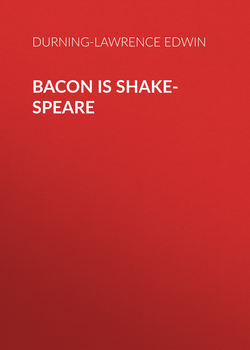Читать книгу Bacon is Shake-Speare - Durning-Lawrence Edwin - Страница 7
BACON IS SHAKESPEARE
CHAPTER VI
ОглавлениеShackspere's Correspondence!
There is only a single letter extant addressed to Shakspeare, and this asks for a loan of £30 It is dated 25th October 1598, and is from Richard Quiney. It reads
"Loveinge Countreyman I am bolde of vow as of a ffrende,
craveinge yowr helpe wth xxxll vppon mr Bushells & my
securytee or mr Myttons wth me. mr Rosswell is nott come
to London as yeate & I have especiall cawse. yow shall
ffrende me muche in helpeinge me out of all the debttes I
owe in London I thancke god & muche quiet my mynde wch
wolde nott be indebeted I am nowe towardes the Cowrte in
hope of answer for the dispatche of my Buysenes. yow shall
nether loase creddytt nor monney by me the Lorde wyllinge
and nowe butt perswade yowr selfe soe as I hope & yow shall
nott need to feare butt wth all hartie thanckefullenes I wyll
holde my tyme & content yowr ffrende & yf we Bargaine
farther yow shalbe the paie mr yowr selfe. my tyme biddes me
hasten to an ende & soe I committ thys [to] yowr care & hope
of yowr helpe. I feare I shall nott be backe thys night ffrom
the Cowrte. haste, the Lorde be wth yow & with us all
amen
ffrom the Bell in Carter Lane the 25 October 1598.
yowrs in all kyndenes
Ryc. Quyney
(addressed)
LS To my Loveinge good ffrend
& contreymann mr wm
Shackespere d[e]l[ive]r thees."
This letter is the only letter known to exist which was ever addressed to William Shackspere, the illiterate householder of Stratford, who as has been pointed out in these pages was totally unable to read a line of print, or to write even his own name. There are however in existence three, and three only, contemporary letters referring in any way to him, and these are not about literature with which the Stratford man had nothing whatever to do – but about mean and sordid small business transactions.
One is from Master Abraham Sturley, who writes in 1598 to a friend in London in reference to Shakspeare lending "Some monei on some od yarde land or other att Shottri or neare about us."
Another is dated Nov. 4th 1598, and is from the same Abraham Sturley to Richard Quiney in which we are told that "our countriman Mr Wm Shak would procure us monei wc I will like of."
A third from Adrian Quiney written (about 1598-1599) to his son Rycharde Quiney in which he says "yff yow bargen with Wm Sha or receve money therfor, brynge youre money homme."
There exists no contemporary letter from anyone to anyone, referring to the Stratford actor as being a poet or as being in any way connected with literature. But from the Court Records we learn that;
In 1600 Shakespeare brought action against John Clayton in London for £7 and got judgment in his favour. He also sued Philip Rogers of Stratford for two shillings loaned.
In 1604 he sued Philip Rogers for several bushels of malt sold to him at various times between March 27th and the end of May of that year, amounting in all to the value of £1. 15s. 10d. The poet a dealer in malt?
In 1608 he prosecuted John Addenbroke to recover a debt of £6 and sued his surety Horneby.
Halliwell-Phillipps tells us that "The precepts as appears from
memoranda in the originals, were issued by the poet's solicitor Thomas
Greene who was then residing under some unknown conditions3 at
New Place."
Referring to these sordid stories, Richard Grant White, that strong believer in the Stratford man, says in his "Life and genius of William Shakespeare," p. 156 "The pursuit of an impoverished man for the sake of imprisoning him and depriving him both of the power of paying his debts and supporting himself and his family, is an incident in Shakespeare's life which it requires the utmost allowance and consideration for the practice of the time and country to enable us to contemplate with equanimity – satisfaction is impossible."
"The biographer of Shakespeare must record these facts because the literary antiquaries have unearthed and brought them forward as new particulars of the life of Shakespeare. We hunger and receive these husks; we open our mouths for food and we break our teeth against these stones."
Yes! The world has broken its teeth too long upon these stones to continue to mistake them for bread. And as the accomplished scholar and poetess the late Miss Anna Swanwick once declared to the writer, she knew nothing of the Bacon and Shakespeare controversy, but Mr. Sidney Lee's "Life of Shakespeare" had convinced her that his man never wrote the plays. And that is just what everybody else is saying at Eton, at Oxford, at Cambridge, in the Navy, in the Army, and pretty generally among unprejudiced people everywhere, who are satisfied, as is Mark Twain, that the most learned of works could not have been written by the most _un_learned of men.
Yes! It does matter that the "Greatest Birth of Time" should no longer be considered to have been the work of the unlettered rustic of Stratford; and the hour has at last come when it should be universally known that this mighty work was written by the man who had taken all knowledge for his province, the man who said "I have, though in a despised weed [that is under a Pseudonym] procured the good of all men"; the man who left his "name and memory to men's charitable speeches, and to foreign nations, and the next ages."
3
This fact so puzzling to Halliwell-Phillipps is fully explained when it is realised that William Shackspere of Stratford could neither read or write.
